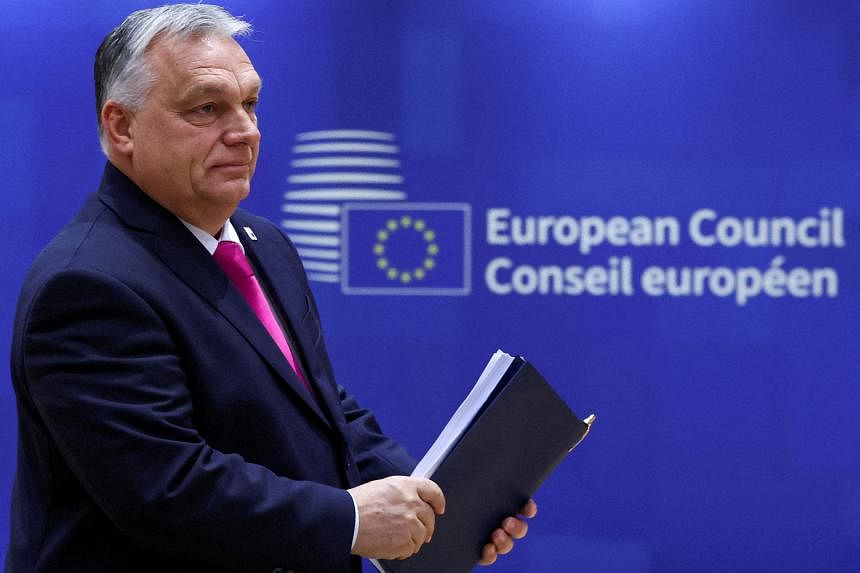BRUSSELS – European Union leaders will seek to agree on Feb 1 on extending €50 billion (S$72 billion) of new financial aid to Ukraine and replenishing a fund used to arm Kyiv, diplomats and officials said. However, Hungary could block the measures.
Western support is existential to Ukraine as it fights against Russia’s full-scale invasion. Moscow started the war two years ago against its neighbour – a former Soviet republic that now wants to join the EU and Nato.
Hungary’s Prime Minister Viktor Orban boasts about his ties with the Kremlin despite the rest of the bloc seeking to isolate Moscow over the war. Budapest already vetoed aid to Kyiv in December, and has voiced criticism over military assistance.
The EU’s 27 national leaders convening in Brussels must agree unanimously to approve the aid to Ukraine from their shared budget.
With the stakes so high, the bloc has stepped up pressure on Mr Orban, though sources in EU hub Brussels said ahead of the summit they did not know if Budapest would agree to what the other 26 member countries are determined to do.
Here is what EU leaders will discuss behind closed doors:
Budget aid
Sources said that there was no deal yet with Budapest over granting Ukraine €50 billion from the bloc’s shared budget until 2027.
In a bid to win Mr Orban over, the bloc proposed an annual debate on the matter, but not a full-fledged budgetary review that would give Budapest the right to veto each time.
While formally separate, the discussion overlaps with a long-running feud between the EU and Mr Orban in which billions of euros that had been earmarked for Budapest in the bloc’s shared coffers remain frozen over democratic backsliding in Hungary.
Should Mr Orban stick to his guns, the EU is also looking at alternative ways of supporting Ukraine. Each of them, however, would be more complicated, lengthy or expensive.
Military fund
Draft summit conclusions have left open whether leaders will also pledge to put another €5 billion into a fund called the European Peace Facility (EPF), which has been used to bankroll donations of weapons to Kyiv.
EU members have been wrangling for months over the future of the fund’s role in military aid to Ukraine, with Germany suggesting the focus should now be on bilateral aid from individual countries.
The bloc’s top diplomat said on Jan 31 the EU would fall far short of its target of sending one million artillery shells to Ukraine by March.
For its part, Hungary has stepped up criticism of the EU’s military support for Ukraine, and has in the past held up hundreds of millions of euros in payouts from the EPF.
Nato awaits Hungary’s nod for Sweden
Swedish Prime Minister Ulf Kristersson said he would meet Mr Orban in Brussels, with Hungary being the only Nato member yet to approve Stockholm’s membership in the alliance since Turkey gave its green light following months of delay.
Most EU countries are also Nato members but the two organisations are separate. The membership application Sweden filed following Russia’s attack on Ukraine is not due to be decided during the summit.
Other topics
EU leaders are also expected to discuss increasing spending on managing migration, Israel’s war with Hamas and the situation in the Middle East, as well as farmer strikes taking place in several European countries. REUTERS

